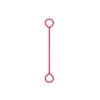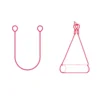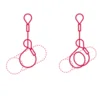Chain slings are a vital tool in lifting and rigging operations, providing strength, flexibility, and adaptability. At CERTEX Lifting, we offer a range of chain sling configurations, each designed to suit a specific lifting requirement. This article will explore various configurations to assist in your upcoming lifting endeavours.
 Single Leg Chain Slings
Single Leg Chain Slings
Single leg chain slings are the simplest form of chain sling. They consist of one length of chain connected to a master link at one end and a hook or other attachment at the other. These slings are ideal for vertical lifts where the load is balanced.
 Double Leg Chain Slings
Double Leg Chain Slings
Double leg chain slings have two lengths of chain attached to a single master link. This configuration provides greater stability than a single leg sling and is suitable for lifting unbalanced loads or for use in a choker hitch.
 Triple and Quadruple Leg Chain Slings
Triple and Quadruple Leg Chain Slings
Triple and quadruple leg chain slings offer even more stability and load distribution. They are ideal for lifting large, bulky, or irregularly shaped loads that need to be kept level during the lift.
 Vertical Sling Configuration
Vertical Sling Configuration
Vertical configurations involve a hook connecting to the load, with the top of the sling connecting to a lifting device. This is the most common configuration and can be used with a synthetic rope, chain, or wire rope sling.
 Basket Sling Configuration
Basket Sling Configuration
Basket chain slings are formed by passing the chain sling under the load and connecting the ends at the top. This configuration improves load stability, allowing for higher capacity than when used in a straight lift.
 Choker Sling Configuration
Choker Sling Configuration
Choker chain slings are used when the load needs to be cinched or drawn tight. The chain is passed around the load and then threaded back through one of its links or a specially designed fitting before being attached to the lifting device.
The configuration of a chain sling plays a crucial role in ensuring safe and efficient lifting operations. It’s important to select the right configuration based on the nature of the load, the lifting environment, and the specific requirements of the task at hand. Always remember, that safety should be the top priority in any lifting and rigging operation. At CERTEX Lifting we're here to help you stay safe and lift smart.
Need further assistance with chain sling configurations?
Chain Sling Regulatory Compliance and Standards
Discover more about regulations and compliance standards relating to chain sling usage.
Preventing Common Lifting Chain Failures
Understanding how to prevent common causes of chain failures is critical to ensure safe operations.



